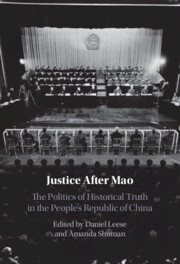'In the aftermath of the Cultural Revolution, a regime that was responsible for millions of deaths attempted to ‘bring order out of chaos’ by carefully, quietly, and systematically reckoning with the traumas of the Mao Zedong years. Leese and Shuman have assembled an all-star team of authors whose chapters sparkle with gripping intensity, showing how an authoritarian system's attempts to offer justice and compensation have strengthened single-party rule while exacerbating and prolonging some survivors' fears and traumas. Full of penetrating insights based on deep readings of rare sources, this book pushes the field of the history of the People's Republic of China to a new level.'
Jeremy Brown - Simon Fraser University
'This groundbreaking volume unveils a riveting and previously unexplored dimension of modern Chinese history, delving into the complexities of addressing past injustices without formal political transitions. The meticulous research, combined with fresh, cross-disciplinary perspectives, creates an intellectual tour de force. A must-read for anyone interested in the intersection of politics, history, and justice.'
Yiching Wu - University of Toronto
'This volume offers the most rigorous and illuminating work to date on what it meant to reevaluate truth, redress injustice, and reimagine the future in China’s transition from revolution to reform. An astounding archive of grassroots sources link the local and the national in a compelling story about people coming to terms with the past.'
Aminda M. Smith - Michigan State University
'China’s post-Mao transition began with a dramatic shift in elite politics, but it led to an intensive and sustained mass campaign of restitution, rehabilitation, and truth-telling. This volume illuminates this neglected side of China’s recovery from Maoism, through which the Communist Party addressed the wreckage wrought by the Cultural Revolution and rebuilt its capacity to rule. This is a major contribution to our understanding of what may be the most important turning point in the history of the PRC.'
Andrew G. Walder - Stanford University, author of China Under Mao
'This deftly edited volume brings into sharp focus critical issues concerning regime legitimacy in post-Mao China. The essays draw on diverse sources to shed new light on the multifaceted dimensions of state-society negotiations, in humanistic terms, over historical injustice. This important book advances paradigm-shifting perspectives both about transitional justice and post-Mao China.'
Wen-hsin Yeh - Richard H. & Laurie C. Morrison Chair and Distinguished Professor of History, University of California, Berkeley
‘Drawing on a rich archive of primary materials in the Maoist Legacy Project and engaging Chinese scholarship, Leese’s and Shuman’s collection of studies changes not only how we understand the Mao period and how Chinese high and low recovered from it, but also how we understand ’transitional justice.’ A model of international scholarship.’
Timothy Cheek - The University of British Columbia
'In the aftermath of the Cultural Revolution, China’s newly installed Party authorities found the need to create a new discursive environment to enable their modernization drive. With the reformist discourse of ‘socialist rule of law’ now replacing Maoist revolutionary justice, many thousands of victims of Cultural Revolution persecution were rehabilitated in the period beginning 1979 to the mid-1980s. This important collection of studies on redressing Cultural Revolution injustices sheds much needed light on this significant time in China’s recent history. Its main contribution is not only that it provides, for the first time in book length form, an insight into the minutiae of the rehabilitation campaign. It also helps us to understand how the Party sought to correct its own wrongs in ways that worked to uphold - rather than undermine - the very institutional structures of power that facilitated the Cultural Revolution chaos.'
Susan Trevaskes - Griffith University



